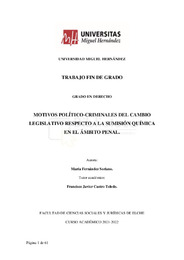Por favor, use este identificador para citar o enlazar este ítem:
https://hdl.handle.net/11000/28125Motivos político-criminales del cambio legislativo respecto a la sumisión química en el ámbito penal
| Título : Motivos político-criminales del cambio legislativo respecto a la sumisión química en el ámbito penal |
| Autor : Fernández Soriano, María |
| Tutor: Castro Toledo, Francisco Javier |
| Editor : Universidad Miguel Hernández de Elche |
| Departamento: Departamentos de la UMH::Ciencia Jurídica |
| Fecha de publicación: 2022-06 |
| URI : https://hdl.handle.net/11000/28125 |
| Resumen : En el presente trabajo de fin de grado se hace referencia a aquellos ataques a la libertad sexual que han sido cometidos a través de la sumisión química, es decir, anulando la voluntad del sujeto pasivo mediante el uso de fármacos, drogas u otras sustancias químicas. En el mismo se realizará un análisis de este tipo de delitos, así como del nuevo proyecto de ley presentado por el Grupo Parlamentario Confederal de Unidos Podemos, la Ley Orgánica de Garantía Integral de la Indemnidad Sexual. Este tipo de ataques a la libertad sexual, se encuentran recogidos en el Código Penal como abusos sexuales. Por ello, en este trabajo se hará referencia no solo a su comisión o penalidad, sino que también se evaluará es si este tipo de conductas, debido a su gravedad, deberían figurar como supuestos de agresión sexual en tanto que se nubla la voluntad de la víctima provocando una clara incapacidad de decisión en la misma. Para ello, veremos en profundidad lo que se entiende por sumisión química, así como los casos en los que se da y otras cuestiones relevantes, con el objetivo de comprender de forma adecuada este tipo de delitos. Por otra parte, se hará referencia a la regulación actual de los delitos contra la libertad sexual, así como a aquellas reformas llevadas a cabo para la mayor protección de las víctimas en este tipo de casos; realizando una mención especial a la Ley Orgánica de Garantía Integral de la Libertad Sexual. Dentro de esta última, veremos el mediático caso que llevó a su elaboración, así como los argumentos en los que se apoya y las varias objeciones que se han puesto a la aprobación de la misma por los partidos políticos de la oposición. En tanto que han sido varios los Estados que se han visto obligados a fijar su atención en este fenómeno, se examinará también cómo se encuentra regulada la sumisión química en el derecho comparado, con el fin de poder tener un mayor acceso a las diferentes normativas que envuelven la comisión de este conjunto de hechos delictivos. Además, cabrá mencionar cómo funciona el código penal y por qué presenta diversas lagunas a la hora de aplicar la ley en este tipo de casos, conociendo la raíz del problema y viendo también, una vez estudiado lo anterior, las medidas presentadas en el proyecto de ley mencionado. In this thesis, reference is made to those attacks on sexual freedom that have been committed through chemical submission, that is, by annulling the will of the passive subject through the use of drugs, drugs or other chemical substances. It will include an analysis of this type of crime, as well as the new bill presented by the Confederal Parliamentary Group of Unidos Podemos, the Organic Law of Integral Guarantee of Sexual Indemnity. These types of attacks on sexual freedom are included in the Penal Code as sexual abuse. Therefore, this paper will refer not only to their commission or criminality, but will also evaluate whether this type of conduct, due to its seriousness, should be included as sexual assault, since it clouds the will of the victim, causing a clear inability to make a decision. To this end, we will look in depth at what is meant by chemical submission, as well as the cases in which it occurs and other relevant issues, in order to properly understand this type of crime. On the other hand, reference will be made to the current regulation of crimes against sexual freedom, as well as to those reforms carried out for the greater protection of the victims in this type of cases; making a special mention to the Organic Law of Integral Guarantee of Sexual Freedom. Within the latter, we will see the media case that led to its elaboration, as well as the arguments on which it is based and the various objections that have been put to the approval of the same by the political parties of the opposition. Since several States have been forced to focus their attention on this phenomenon, we will also examine how chemical submission is regulated in comparative law, in order to have greater access to the different regulations governing the commission of this set of criminal acts. In addition, it will be worth mentioning how the penal code works and why it has several loopholes when it comes to applying the law in this type of cases, knowing the root of the problem and also seeing, once the above has been studied, the measures presented in the aforementioned bill. |
| Palabras clave/Materias: abuso sexual agresión sexual Código Penal Ley Orgánica de Garantía Integral de la Libertad Sexual sumisión química vulnerabilidad química |
| Área de conocimiento : CDU: Ciencias sociales: Derecho |
| Tipo de documento : info:eu-repo/semantics/bachelorThesis |
| Derechos de acceso: info:eu-repo/semantics/openAccess Attribution-NonCommercial-NoDerivatives 4.0 Internacional |
| Aparece en las colecciones: TFG- Derecho |
 La licencia se describe como: Atribución-NonComercial-NoDerivada 4.0 Internacional.
La licencia se describe como: Atribución-NonComercial-NoDerivada 4.0 Internacional.
.png)
